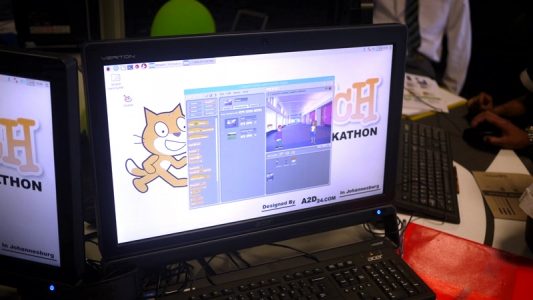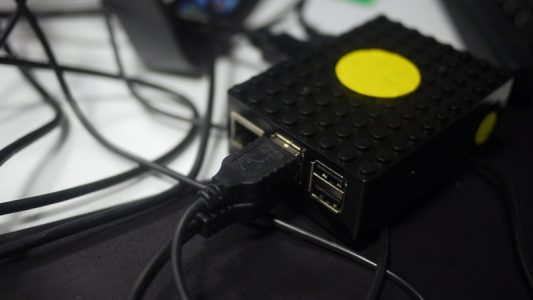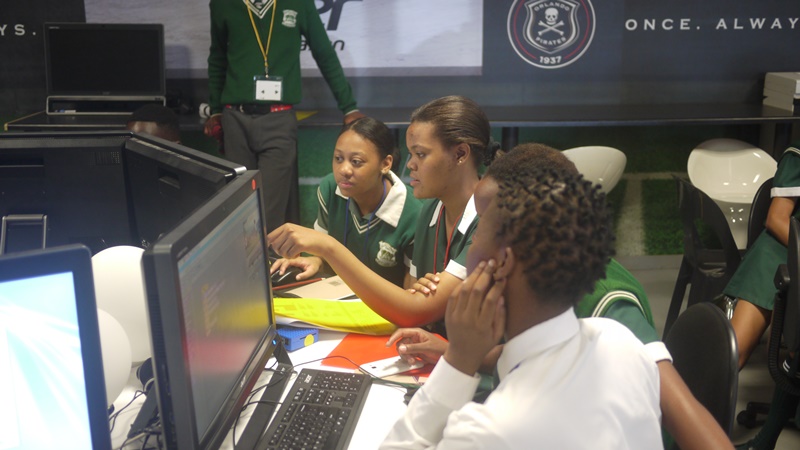“I wanted to be a doctor, but after today I think I want to go into IT,” Thandi* a grade 11 pupil tells us as she has her code debugged.
Thandi is a student from a high school in Eldorado Park and last week along with over 100 other Grade 11 pupils she was attending the the Scratch Hackathon at the Orlando Stadium Learning Centre hosted by A2D24 in conjunction with the Gauteng Department of Health.
The students of Eldomaine High School, Silver Oaks High School and Eldorado Secondary School are learning to code with the language developed by the Michigan Institute of Technology. Scratch as it’s known is a graphical programming language that teaches beginners the basics of coding.
As founder of A2D24 Muhammad Simjee, explains to the learners, “Don’t be surprised that it’s colourful. The concepts that you’ve learned are the exact same concepts we use to make any sort of software.”

“For the past two days our goal has been to give you the same skills we had when we first started using Raspberry Pi,” says Simjee. The hope was that if we could give you the same skills we had when we first started using it that you could come up with your own ideas, and build your own product, your own solutions and your own companies.
Not the legendary city of gold
Eldorado Park borders the historic township of Soweto but unlike the mythical city of gold it shares a name with, the area is plagued by crime and drugs.
“The world is full of stories of under privileged children going on to reach the top of the world in their specific fields of interest. But to the children of Eldorado Park and similar areas this is just a story that their parents and teachers tell them,” Eldomaine High School’s principal Ashley Pienaar explains to members of the press and guests of A2D24.
“These areas are at times are void of real role models. All [the students] speak to daily are your gangsters, your drug dealers, your con artists. Their experience of life is false promises from local authorities.”
The principal’s hope is that despite their circumstance, the learners will see what is capable with the help of technology and be inspired to solve the problems that face not only them but so many others on the African’s continent.
“We look to people in boardrooms with ties to solve problems, but I myself have learnt from children,” remarks Pienaar illustrating that often the best solutions are not created by men in suits and ties.
Inspiration through creation
As part of the hackathon participants were tasked with creating a game or an animated story that centred around the topic of health. Some used Scratch code to craft intricate animations using pre-made assets, while others focussed on the subject matter and got by with the little coding knowledge they had retained over the course of the two day hackathon.
It’s like any other hackathon we’ve attended only the tick-ticking of keyboards has been replaced with the excited chatter of school learners discussing their projects. Just like any other hackathon the students are working to a tight deadline. There are two minutes left and while some students are waiting for time to be called some students are debugging their work.
The students are using a Raspberry Pi to do their coding on. This small, low powered and most importantly low cost devices helps to bridge the digital divide somewhat according to A2D24.

“You don’t need R10 000 to get a desktop or laptop computer any more. A Rasperberry Pi kit costs R1 100 and that comes with all the components. It gives kids similar advantages to the advantages kids in affluent areas have,” A2D24’s Sofiah Docrat tells us.
At the end of the hackathon each student would take home their own Raspbery Pi. A2D24 hopes that this will inspire them to carry on learning and practicing the skills they learned at the hackathon or at the very least be inspired to pursue a career in science and technology.
Breeding creation
While Thandi had no idea that she was getting a Pi to take home she told us that she desperately wants to learn more remarking saying, “this was easy, I want something that’s more of a challenge now.”
Indeed the principal of Eldomaine hopes the same. “The next Facebook or Uber or Google is going to come out of Africa, I know it, and projects such as this inspire me,” says Pienaar.
Pienaar implores the learners to not let their work end here and use these skills to make their mark not only on Africa, but the world. “Our students are going to fill those IT boardrooms” he says, “Africa is going to become a powerhouse in the IT world.”
Looking across the Orlando Stadium Learning Centre I can’t help but smile. These learners are truly excited, more excited than I can remember ever being about a school event and while some of them aren’t interested in IT, they’ve been given a chance to see what it involves, an opportunity I wish had back in high school.
As Pienaar says, “The African youth is rising” and while we agree, every child deserves a slice of the pie if we hope them to solve the problems we don’t seem to be able to.
*Name changed.

